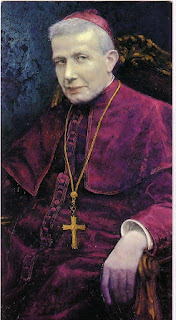Blessed Marcelo Spinola
"I can do all things in Him who strengthens me."Phil 4:13

Founder of the Congregation of the Handmaids of the Divine Heart
Marcelo
Spinola Y Maestre was a very loving person. He was willing to sacrifice his
life for Christ. He was born in San Fernando (Cadiz Province), Spain on January
14, 1835. He had his normal life and was baptized by Fr. Jose Carillo. He had
his father Don Juan de Spinola Osorno and mother Doña Antonia Maestre Y Osorno,
who were both very supportive for their children. They had 8 children but only
4 of them survived: Soledad, Marcelo, Rafael and Rosario. They were the
Marquises of Spinola. Italy is were the Spinolas came from and Belgium for the
Maestre. Marcelo’s Grandfather Don Marcelo Spinola was born in Genoa and was a
Lieutenant General of the Royal Army. Blessed Carlos Spinola was a Jesuit
martyr beatified in 1987, also came from the same roots. Don Benito Antonio
Spinola, a Genoese, was the commander-in-chief of the vessel named “Good
Counsel”, who’s serving under the king of Spain. King Ferdinand VI gave him the
title “Marquis of Spinola. Spinola in Italian means “Thorn”, it was after the thorn in the
crown of the Lord which was venerated and owned by the family.
Marcelo
learned to read and write at home. He attended a simple school run by priests
where he took two courses in Latin and finished with excellent grades at the
age of 10. In the next 3 years, he finished a Bachelor’s Degree. In his first
year he studied in Santo Thomas College in Cadiz with a course in Philosophy.
In his second year he studied in Motril, and in his third year he finished in
Granada where he took up Physics, Chemistry and Natural Sciences. After a year
he took up his final examination and won a title of Bachelor in Philosophy at a
very early age. Marcelo took up an “extended course”, a kind of orientation
course for further university studies. After all this things, Marcelo was sent
by his father to the University of Valencia, where he enrolled at the College
of Law. He got the highest ratings in all his subjects, his academic records
were most brilliant. In the University of Seville, his professor Don Francisco
Arboleya signed his last records: Absences: NONE; Character: GOOD; Interest:
SUPERIOR; Sanctions: NONE. At the age of 21, he became a lawyer. He practiced
law in Huelva, he choose to defend the cause of the poor not to have a profitable incomes to earn; he saw in his
clients persons in need of help. He would advise them wholeheartedly without
any fee. He wouldn’t allow his clients
to pay, so they just gave him fruits, eggs, chicken from their farms leaving it
at his doorsteps without letting him know. He was a very good lawyer and a
pacifier in judicial court. Because of this he had a Perpetual profession in life:
“The Defender of the Poor and the Needy”. He was the instrument of peace and
reconciliation for people with conflicts.
Monsignor
Diego Herrero, a very good adviser of Marcelo helped him discern his vocation
to the priesthood. In 1863 Marcelo renounced the title “Marquis of Spinola”
which belongs to him by right as the eldest son of the family, in favor of his
brother Rafael. In May, 1863 he wore the clerical cassock as a seminarian for
the first time. Humility was the companion of his life and the most constant
trait of his personality. A year after
being a seminarian finally he was a priest by Cardinal Lastra on May 21, 1864
at the age of 29. Marcelo’s first mass was on June 3; preacher – Fr. Cayetano
at 8:30 AM the time of the mass was also when Rafael was dying in Santo
Domingo, Cuba at the Laguna Verde battle. Lola Martinez Peris are the one who
delivered the sad news to the family, she was the young fiancé of Captain
Spinola and was married to the friend of Rafael. His 1st Requiem was
for his brother. As a Parish Priest of San Lorenzo, Marcelo used to open his
church almost at dawn and sit in the confessional box so he could listen to
confessions patiently and at length for many hours. He was a very well-known
preacher and a very well-known good confessor, no wonder people from different
places would come to his Parish just to listen in his homilies and to confess
to him. The confessional box of Marcelo was described as the healing pool of
Seville. He founded a newspaper named “El Correo de Andalucia”. In 1881 he was
elected Auxiliary Bishop of Seville. In 1896, he became the archbishop of
Seville. In 1905 he begged alms under the scorching heat of the sun in the
streets of Seville in order to help the
victims of the big drought and famine of that year, people would slur him. For
this great act of love the people of Seville gave him the title “The Beggar
Archbishop” On December 11, 1905 Pope St. Pius X elevated him to become a
cardinal.
He
died on January 19, 1906, and was beatified in Rome by Pope John Paul II on
March 29, 1987.









No comments:
Post a Comment